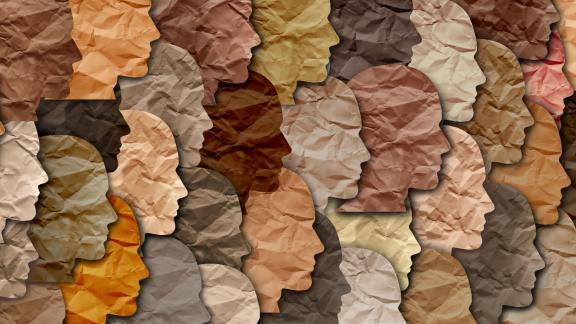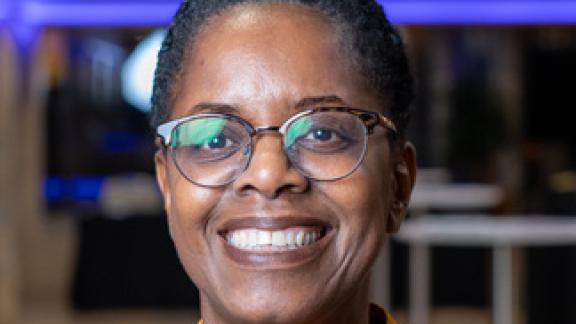It’s not enough to be non-racist

One week since the launch of our anti-racism strategy, Wayne Farah shares his learning from the BME Leadership Network’s lecture on the impact of racism in science and medicine, and outlines his view on how we can and must build an anti-racist NHS.
If you are a leader in health and care, you really needed to be in the room to hear from Dr Adam Rutherford, geneticist and author of How to Argue With A Racist, and Control - The Dark History and Troubling Present of Eugenics. Dr Rutherford delivered the annual BME Leadership Network’s Black History Month lecture and his presentation Race, Scientific Racism and Medicine took aim at some shibboleths, and offered new insights on building an anti-racist NHS.
Race is a social construct
The first shibboleth was the neutrality of the scientific foundations of medicine. The modern concept of ‘race’ was invented by the architects of the enlightenment and scientific method, including Linnaeus, Voltaire, and Kant; renowned scientists who were criticised for being white supremacists and racists by their contemporaries, including Darwin. They abused the scientific method to create the race science that produced the racial typologies that we still use. They did so not just to serve their egos and maintain the class divide, but to support European colonial expansion and the trans-Atlantic slave trade.
Dr Rutherford’s analysis challenged a second NHS shibboleth: that racism can be explained by a psychological fear of others, unconscious biases, or lack of education. We know the human race does not break down into sub-species, but we continue to use Linnaeus’s racial typologies, even though they are meaningless in biology, genetics, and medicine.
Race is a social construct. People do not belong to a race, they are racialised into groups for social reasons. Race then has no biological foundation, but racism means it has real-world consequences in the same way time and money are social constructs and we know what happens if we don’t pay the rent on time!
The propositions that South Asians have higher rates of diabetes or African-Caribbeans have higher rates of hypertension allows ideas of race, ethnicity, population etc, to be used interchangeably and without precise definition. A kind of race science that is essentially made up.
This facilitates the racialisation of diseases and communities, as was the case with Tay-Sachs disease, a condition once routinely discussed as the Jewish disease, even though the same symptoms were given a different name when identified in other populations.
We have to reject the race science that leads us to look for the causes of inequality in the bodies and cultures of black communities, and begin to analyse the practices and behaviours of the NHS
Dr Rutherford remined us of Dr Angela Davis’s challenge that in a racist society it is not enough to be non-racist, you must be anti-racist. One barrier to the NHS progressing towards anti-racism is that it seems comfortable simply generating ever-growing data sets that describe racial disparities in ever-increasing detail, and then simply asserting that disparities arise from racial prejudice. The real task is to begin to define the mechanisms of institutional racism and evidence how they produce specific health inequalities. We have to reject the race science that leads us to look for the causes of inequality in the bodies and cultures of black communities, and begin to analyse the practices and behaviours of the NHS.
I suspect those practices and behaviours will be found to be closely related to the failed cultures seen in the many other instances where the NHS has failed to care for the most vulnerable in communities, from Mid-Staffs to Morecambe Bay and Telford.
To build an anti-racist NHS, we will need to reject race science
Dr Rutherford evidenced how the pseudoscience of yesterday laid the foundations for institutional racism in the NHS today. To build an anti-racist NHS, we will need to reject race science, particularly where such ‘science’ is being utilised in regard to the disproportionate impact of COVID-19 on racialised communities. We will need to recognise that the discrimination such communities currently experience in today’s NHS reflects the wider realities of inequality in Britain. We might then reflect on our role as leaders, ensuring that we do not normalise policies and processes that promote those inequalities through the NHS, by remembering Nye Bevan’s insight: “If freedom is to be saved and enlarged, poverty must be ended. There is no other solution.” 1
Wayne Farah is co-facilitator of the NHS Confederation’s BME Leadership Network, and non-executive director of Coventry and Warwickshire Partnership NHS Trust. You can follow the BME Leadership Network on Twitter @nhsc_bmeleaders
Footnotes
- 1. A Bevan (1952) in Place of Fear. William Heinemann Ltd ↑




